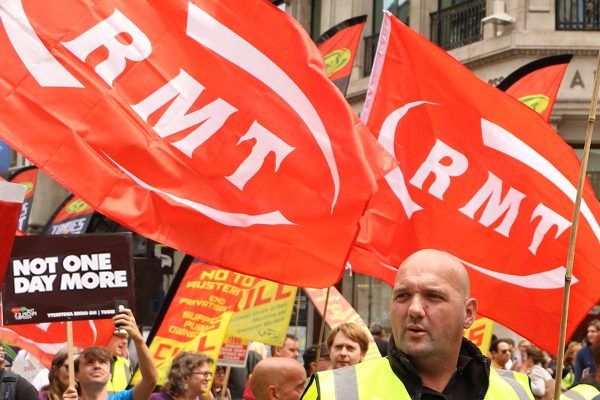Wednesday 15 March will see hundreds of thousands of workers out on strike. Following on from last month’s ‘day of action’ on 1 February, unions across the public sector are once again all walking out together.
A national demo in London, organised by the NEU, will bring tens of thousands onto the streets. Meanwhile, local rallies are set for the same day in towns and cities across the country, bringing out tens of thousands more.
These strikes and protests are timed to coincide with Budget Day, when Chancellor Jeremy Hunt will announce the government’s spending plans for the year ahead, including any potential pay rises for public sector workers.
The message from the trade unions is clear: workers want real pay rises, not cuts!
On this latest day of action, teachers, civil servants, and university staff will be joined by junior doctors in the BMA, as well as trainee dentists in the BDA and colleagues in the HCSA (Hospital Consultants and Specialists Association).
Prospect members in the civil service are also coming out, alongside those organised in PCS. And on the London Underground, Tube workers organised in ASLEF and the RMT will also be walking out, in a continuing dispute over staff cuts and attacks on conditions.
This coordinated strike day will therefore be bigger than the last. This is a welcome step forward, showing that more and more layers of the working class – including sections that were once perhaps considered more privileged – are now joining the struggle.
Whatsmore, this united action is set to continue into Thursday 16 March as well. Not only will the education system in Britain be effectively shut down, as the UCU and NEU come out together again, but RMT members working for the train operating companies will also be paralysing Britain’s rail network with the first day of their latest round of strikes.
Carrot and stick
As more unions join the fray, the Tories must be sweating through their Saville Row suits. And feeling the heat, they are turning to new – or rather, old – methods in an effort to divide the labour movement and quell the strikes.
Recently, for example, the Tories have found that the infamous ‘magic money tree’ does in fact exist – and has miraculously borne fruit.
An unexpected extra £30 billion has been found down the back of the sofa, it seems, apparently the result of various accounting and forecasting errors, amongst other factors.
This sum may be enough for Hunt to provide pay rises to some, but not all, public sector workers.
Given the high support for nurses, and for NHS staff more broadly (one needs only to stand on an RCN picket line for five minutes to experience this firsthand), the Tories may look to peel these workers away with a slightly improved pay offer, while leaving others high and dry.
All the while, the Tories’ draconian anti-strike bill is making its way through the House of Lords.
As ever, it appears that the ruling class is looking to employ a combination of the ‘carrot’ (of increased pay offers) to splinter off some unions, alongside the ‘stick’ (of repressive laws) with which to beat back the rest.
Tory tricks

The Tories and bosses also appear to be relying on manipulated numbers and twisted figures in an effort to bamboozle workers.
They note that inflation is beginning to slow, making unions’ pay demands even more ‘unreasonable’. But whilst inflation might be (very gradually) coming down from its eye-watering peak, it is not negative. Prices are still going up, just not quite as fast. So workers’ wages will still be lagging behind their rents and bills.
Another variant of this is to offer two-stage pay rises, but to present this as a single annual offer, making real-term cuts seem like inflation-busting increases.
For instance, firefighters in the FBU recently voted to accept an offer with a 12% pay rise headline. But reading the small print, this in fact breaks down into a retroactively applied 7% offer and a 5% increase from this July.
Meanwhile, inflation has been running higher than this level throughout the period in question, meaning that firefighters’ wages will not be catching up with prices.
Similarly, RMT members on Network Rail have suspended their planned action, as they vote on a reported 9% pay deal. In reality, however, this is a 5% increase backdated to January 2022, and a further 4% from January 2023.
And at the time of writing, there are rumours that the government will look to sweeten their below-inflation offer to public sector workers by throwing in an additional one-off lump sum. But again, this will do nothing to help workers with permanently higher living costs going forwards.
Workers can see through this chicanery. Nonetheless, union members must always be given the final say over whether to accept such deals, as is the case with the FBU and RMT. Any attempts by the trade union leaders to sell out their members with rotten deals must be staunchly opposed.
‘Good faith’
Unfortunately, some unions have proven themselves to be more susceptible to the Tories’ dirty tricks and divide-and-rule tactics than others.
The end of February saw the RCN suspend their strikes, for example, in order to enter ‘intensive’ pay negotiations with the government. They were followed the week after by Unison, who were also set to bring out members in the NHS, and by ambulance drivers organised in the GMB.
Earlier in the same month, the UCU leadership also suspended two weeks of scheduled strike action, as a sop to the bosses. The justification for this was essentially based on platitudes by the employers, without any concrete promises.
Furthermore, this decision was imposed on members without any consultation, and at very short notice, angering many rank-and-file union activists.
Lo and behold, in these two weeks, the employers association UCEA advised university bosses to impose the poor pay deal that UCU members were fighting against.
Health unions have correctly voiced doubts about whether the government is approaching these negotiations in good faith, or whether such talks are really a stalling tactic. Whatever the case may be, the lesson from the UCU dispute is that the unions must not bend the knee.
The only reason that the bosses and the government are starting to come to the table is due to workers taking militant action. Continuing and escalating this action – not suspending it – is the way to maintain the pressure on the bosses and Tories, and to force them to concede.
The bosses, everywhere and always, have demanded that the unions behave in a ‘chivalrous’ and ‘respectable’ manner. All the while, the ruthless ruling class plots how they will undermine and attack workers.
The union leaders must not fall for this cynical and hypocritical ‘good faith’ rhetoric. Weakness only invites aggression. But militancy pays.
Unity
![]()
Above all, the trade union movement must not allow itself to be divided. Instead, the unions must continue to deepen and strengthen the unity between these struggles.
If the Tories attempt to splinter off this or that union, with separate negotiations and bespoke offers, then the response of the union leaders should be: it’s all or nothing – either all of us meet around the table, or none of us.
After all, as has been acknowledged in speeches by many of the trade union leaders themselves, the fights being waged across the labour movement are largely the same: for proper pay rises, and for an end to the bosses’ attacks. All these battles are part of the same wider struggle between the working class and the capitalists.
NHS workers should therefore not allow the Tories to leave teachers up the creek, while they accept a slightly-improved offer. Likewise, civil servants should not accept any pay deals while RMT members are stonewalled.
We cannot allow the struggle to be broken up on the terms of the bosses. As the old saying goes: An injury to one is an injury to all! United we stand, divided we fall!
Escalation
Further days of united action like 15 March will continue to breathe confidence into the reawakening movement.
Workers coming together at picket lines and rallies – from across different industries and sectors – will reinforce the unity of the working class, which is our movement’s greatest strength.
The joint nature of this struggle must be consciously recognised and pursued. Currently, coordination is being pushed by left-led unions like the PCS and NEU. The next step is for the major battalions of the trade union movement, such as Unison, Unite, and the TUC as a whole, to take a militant stand and bring workers across the board out together.
At a rank-and-file level, this unity can begin straight away, through the establishment of strike committees, linking up workers from different unions within the same industry or workplace.
Similarly, trades councils and other local bodies should bring together grassroots activists and representatives from striking unions, in order to coordinate action in every town and borough, and to enable workers to discuss the way forward for the movement as a whole.
Above all, the trade unions should be mobilising a mass campaign to build for escalated, coordinated action across the entire public sector, including a one-day general strike, in combination with protests and rallies across the country.
The aim must be not only to win on pay, and smash apart the government’s anti-union laws, but to topple the Tories and end their austerity agenda once-and-for-all.
Leadership

The trade union leadership must not blink or buckle in the face of sweet words from the Tories. They will seek to divide us however they can. We cannot let them.
Striking workers have shown enormous energy, determination, and sacrifice. We must warn, however, that the working class does not have endless reserves. If the movement does not keep moving forwards, then it could dissipate and fracture.
What is needed is a clear strategy to win, and a bold socialist programme that can inspire workers to fight.
This should include demands for a sliding scale of wages, with pay rises automatically tied to inflation; for an end to austerity and cuts, with the bankers and billionaires expropriated to properly fund public services; and for workplaces and industries to be put under the control of the working class.
More than anything, what recent events make clear is the decisive role of leadership. With a militant, revolutionary leadership at its head, the labour movement would be unstoppable. After all, there is no force on Earth more powerful than the working class, when organised, mobilised, and made conscious of its own strength.
Building such a leadership is the urgent task facing us, as Marxists, in order to guarantee the success of the coming revolutionary struggles, in Britain and internationally.






